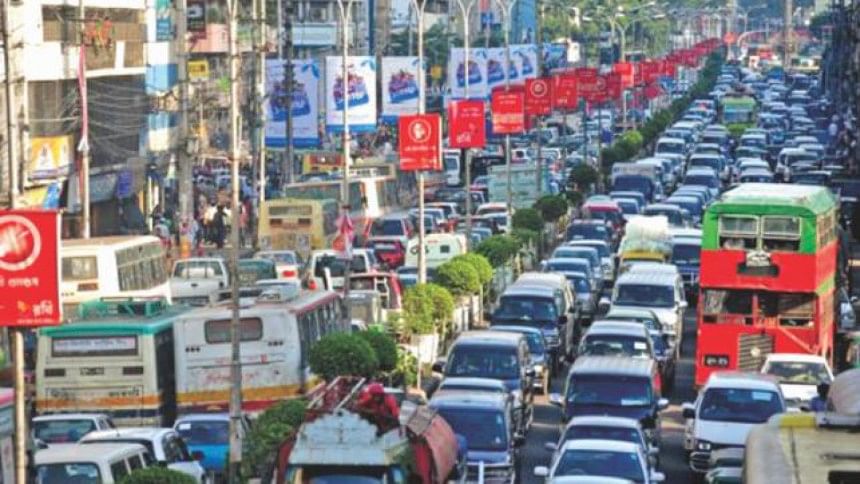The Gordian Knot of Dhaka city governance

"It was a beautiful city, sometimes easily mistaken for a village"
FB Bradley-Birt, The Romance of an Eastern Capital (1906)
We have managed to turn a serene, rustic, romantic Dhaka into a dishevelled, messy concrete slum just within a century. What a feat! The issues are many: governance failure, dysfunctional coordination committees, traffic congestion, elite capture of city investments, lack of comprehensive planning, etc. All these problems have multiplied over the years, making the situation worse.
The solutions that have emerged are mostly a repetition of previous ones: improving governance through establishing a metro-government with its own constitution; improving coordination among more than four dozen service agencies; coordination with the Prime Minister's Office; corporate ownership of the transport sector; development of mass transport; introduction of bonds for raising funds; learning lessons from the Pudong and Kolkata models, etc.
But it seems that we have not addressed the elephant in the room. Why has there been persistent failure of governance for decades? Why is there elite capture of city investments under a democratic system? Is it a problem of land or money shortage? Or, is it the dysfunctional process of governance? Why does this dysfunctionality continue? This piece focuses on this last issue.
In framing the governance of a metropolitan city, we should look at three dimensions. First, the legitimacy of the regime is beyond question because our two mayors have been elected through a democratic process. Second is the competence of the regime. Here, we have serious deficits particularly among the elected ward commissioners and the serving bureaucrats. Together with handling the age-old urban issues, the corporation managers have to pay heed to additional challenges of controlling pollution and environmental sustainability—what we call management of brown and green issues. Whatever competence there is, is compromised in absence of public servant and service orientation.
The final and most important dimension is the process of functioning of the regime. This is the Gordian Knot, or an "intractable problem." Our two mayors have acknowledged themselves as "Nidhiram Sardars." Most of the service jurisdictions that they are supposed to take care of to satisfy voters' expectations are beyond their control. This lack of command of the elected caretakers over the manifold vital city services is regrettable.
True to his late father's wish, the Mayor of Dhaka South renewed his emphatic demand of an independent metro-government as the prime remedy for this imbroglio. This demand was echoed by successive mayors of Dhaka and also by the former Chittagong mayor. With just one percent of land, Dhaka city contributes to 36 percent of the country's GDP.
Here, let me cite an extraordinary example of autonomy enjoyed by a US state agency. About a decade ago, a letter was sent from the White House to the Virginia Transport Authority that an entourage of President Bush Jr will pass through the speedier toll-road off the Dulles Airport to attend a campaign rally. The agency boss replied 'yes' with the condition that the president would have to pay for the income forgone when private commuters are barred from using the road. He neither earned the wrath of the most powerful man on earth, nor lost the job!
So why does the repeatedly-raised city government issue fizzle out? The reason is well-known: the successive central governments showed no interest in letting the prime seat of power out of their control. After all, the development of Bangladesh is very much Dhaka-centric.
Given appropriate policy instruments for fund mobilisation, the city corporations can fully sustain themselves, independent of what the central government doles out. The tenure of elected mayors cannot be cut short by the government, as was evident from Khoka holding onto the post of mayor for nine years. Then why cannot they be independent? We need to delve deeper into these issues.
Central to this process of regime-functioning is the coordination among so many disparate agencies, with their purpose being the same: providing services to citizens. The successive governments since the 1980s have instituted coordination committees, either led by the mayors or by the PMO. The mayor-led outfit apparently does not command enough power to ensure the presence of agency bosses in city corporation meetings. The principal secretary of the PMO also led this process for some time. So why didn't the services improve? Perhaps, the problem lies in the culture of impunity wherever power, either economic or political, is involved.
Finally, let me briefly touch on the transportation problem. The country director of the World Bank has laid bare a few horrifying facts about the massive cost of traffic jams. The Mayor of Dhaka North has proposed that this problem can be solved through corporate ownership. He did not elucidate the difference between the current ownership and control of the sector. Prothom Alo, on February 19, 2014, ran a story about politicians as the main owners/controllers of the lucrative transport business. Businessmen-politicians run the show because route permits can be managed only with power and connections. This is actually one of the primary reasons why ticket prices in this sector are out of control and why killer-drivers are hardly ever brought to book. Our sense of "conflict of interest" in the public sphere is almost zero.
Finding an answer to the Gordian Knot of city governance won't be easy or simple. But what we need to do, first and foremost, is make our institutions more accountable and transparent. We need to strengthen coordination among all the relevant agencies, and rise above the culture of impunity holding us back from working together. Only then can we begin to solve the numerous problems plaguing this city.
Mizan R Khan is professor of environmental management at North South University.

 For all latest news, follow The Daily Star's Google News channel.
For all latest news, follow The Daily Star's Google News channel. 



Comments